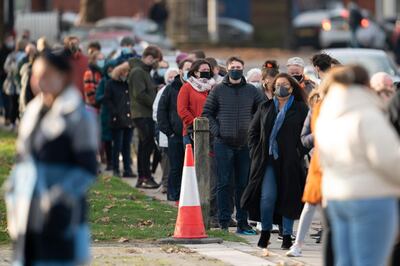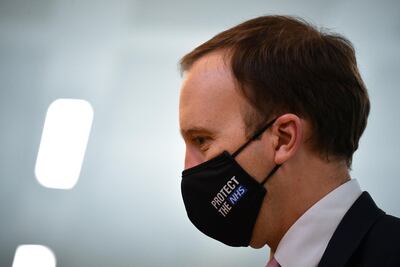UK Health Secretary Matt Hancock has put Britain's National Health Service on notice to distribute a coronavirus vaccine within three weeks.
The alert came after news that testing showed the first effective coronavirus vaccine can prevent more than 90 per cent of those who are given it from catching the virus.
The inoculation - developed by Pfizer and BioNTech - was tested on 43,500 people in six countries and no safety concerns were raised.
Mr Hancock said the NHS was told to be ready from the start of December to use the vaccine.
He told Sky News: "Of course, there are many hurdles that still need to be gone over, and we haven't seen the full safety data and that is critical and we won't deploy a vaccine unless we can be confident in its clinical safety.
"But we also do need to be ready should a vaccine be licensed and get through all those hurdles and ready to roll out."
However, Mr Hancock said the UK faced what he called a mammoth logistical operation in distributing the vaccine.
At-risk groups, including those in care homes and care home workers, would be first to receive it.
The operation would then proceed according to age, with over-80s next in line.
The health secretary said the government was yet to see the safety data behind Pfizer's vaccine, although the companies behind the inoculation planned to apply for emergency approval by the end of the month.
The UK has ordered 40 million doses - enough to vaccinate up to 20 million people as each person requires two doses for it to work effectively.
Prime Minister Boris Johnson warned there were still significant challenges ahead, but the move was welcomed by scientists.
Prof Adam Finn, professor of paediatrics at the University of Bristol, agreed that a rollout in the UK was imminent.
He told BBC Radio 4's Today programme: "I don't think there is much waiting left to be done.
“We are going to see it being used almost certainly in a few weeks from now.”
In another vote of confidence, Prof John Bell of Oxford University, a scientific adviser to the government, told the BBC on Monday that he believes life could return to normal by spring.
“I am probably the first guy to say that, but I will say that with some confidence,” he said.
However, Mr Johnson took a more cautious view, saying it is still "very, very early days".
He said: “The vaccine has cleared one significant hurdle but there are several more to go.
"The biggest mistake we could make now would be to slacken our resolve at a critical moment."
Mr Hancock said the UK had very strong rules on medical safety and the regulator - the Medicines and Healthcare products Regulatory Agency - would make the final call.
He said final approval would "most likely take weeks" but that "it happens at the speed of the science".
The vaccine will be manufactured in Belgium.
It will be optional to receive the jab in the UK.
Mr Hancock said the government was planning for people to be inoculated at vaccination sites, GPs, pharmacists and in care homes.
Another major challenge is storage, as the vaccine needs to be kept at a temperature of -70C.
Asked if GPs would be able to store the drug at such a low temperature, Mr Hancock said timing - between leaving the manufacturer to the patient receiving the inoculation - was critical.
“It can’t be taken out of -70C more than four times … but for the last 48 hours it is okay to have it at a higher temperature,” he said.
Jonathan Van-Tam, England’s deputy medical officer, used a football analogy to describe the state of affairs.
“This is like getting to the end of the play-off final, it’s gone to penalties,” he said. “The first player goes up and scores the goal.
“You haven’t won the cup yet. But what it does tell you is that the goalkeeper can be beaten, and that’s where we are today.”
Meanwhile, experts said that anti-vaccination myths could slow take-up of the drug.
The Royal Society and British Academy called for the spreading of anti-vaxxer conspiracy theories to be made a criminal offence.
It said countries such as Singapore have laws against the spreading of information deemed harmful to public health.
Prof Melinda Mills, of Oxford University, and co-author of a review on coronavirus vaccine, said it was crucial to address misinformation.
“These groups are very skilled,” she said. “They feed on fear, that little grain of truth and they amplify it.”










